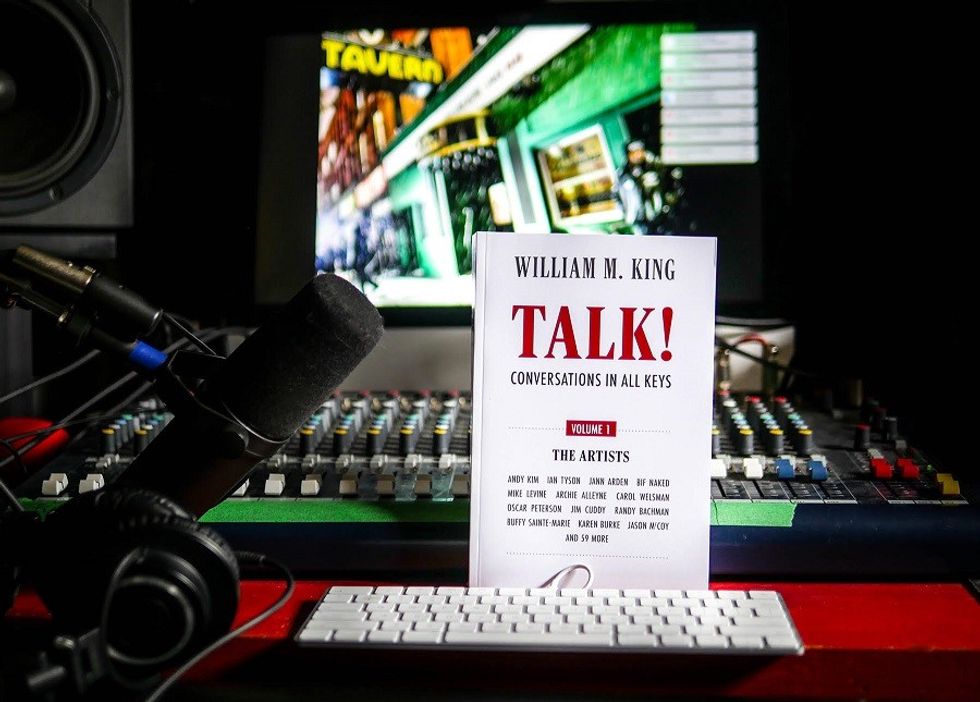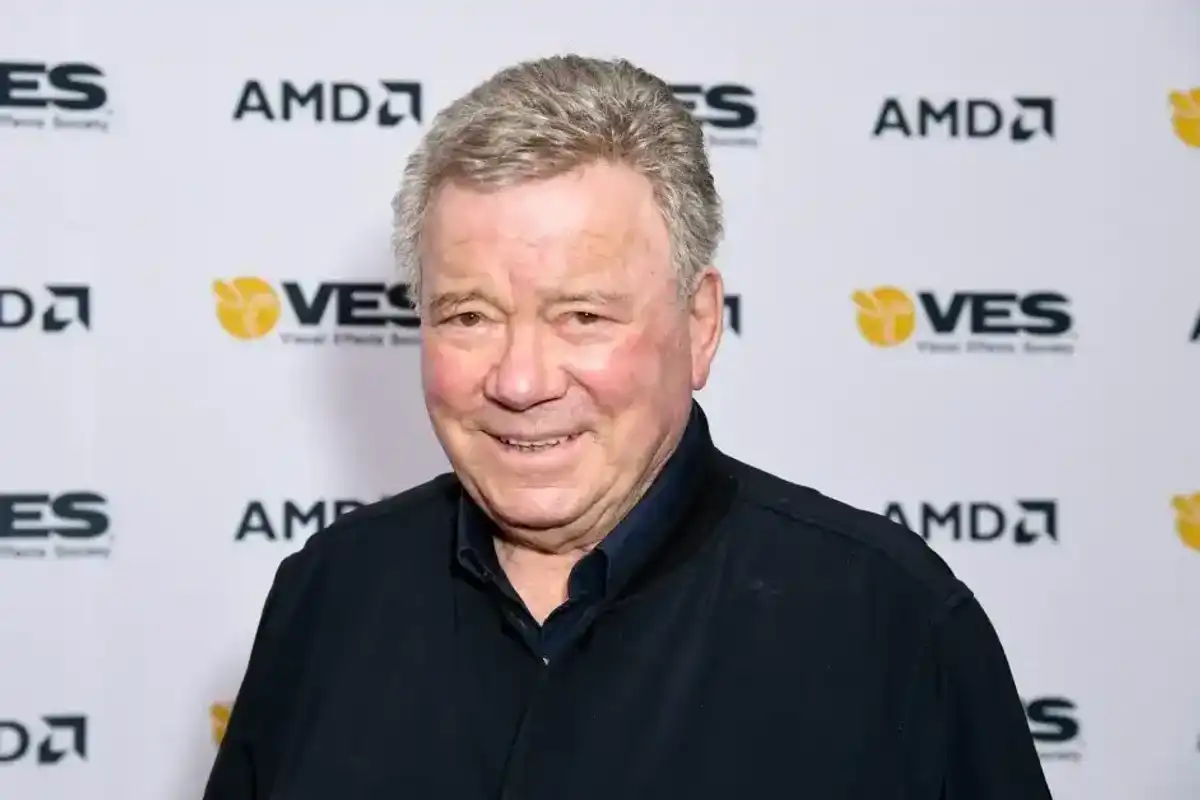Bill King Book, 'Talk', Comprises 72 CanArtist Interviews
The self-published 434-page anthology compiles 72 of his interviews into Volume 1 with first-person stories old and new provided by Andy Kim, Jim Cuddy, Randy Bachman, Buffy Sainte-Marie, Jann Arden, Diana Krall, Bif Naked, Bruce Cockburn, Oscar Peterson, Frank Mills and Jeff Healey.

By Karen Bliss
Bill King, a columnist for FYI Music News, an accomplished photographer, radio host (Toronto’s JazzFm, Newstalk and CIUT 89.5), music producer, composer, recording artist and jazz pianist whose 50-plus year career includes working as the musical director for Janis Joplin, Linda Ronstadt and The Pointer Sisters, received his shipment of his latest book, Talk! Conversations In All Keys, just as Toronto was going into lockdown over the COVID-19 pandemic.
The self-published 434-page anthology, which compiles 72 of his interviews into Volume 1 — such as Andy Kim, Jim Cuddy, Randy Bachman, Buffy Sainte-Marie, Jann Arden, Diana Krall, Bif Naked, Bruce Cockburn, the late Oscar Peterson, Frank Mills and Jeff Healey — can be purchased directly from King at billkingpiano@gmail.com, 7arts.press, and www.musicbooksplus.com/TALK
As the majority of us are at home, as per social distancing, it’s the perfect time to disappear from the stress with a good book. “Right now, in this moment, I don't feel like pushing my book because I know we're all looking at hardships this next month or so, and how things are going to look financially,” says King, “But they can just contact me.”
Still, FYI turned the tables on the interviewer and asked him some questions over the phone.
Why did you want to do a compendium of your interviews vs. a memoir? Clearly your life is interesting. Just the first paragraph of the Preface, you mention the El Mocambo, hashish, and radio legend Bob Mackowycz.
Arnold Gosewich [the late literary agent] contacted me about five years ago about writing a memoir. But as I started writing, he kept saying, ‘We want celebrity-driven memoirs.’ I wrote the memoir up to around 1972, but it pertained to what it was really like to travel across America in the 60s as an 18, 19, 20-year-old kid and what I saw firsthand. That wasn't exactly what they were looking for. When he went to big publishers, they were looking for behind-the-scenes stories on Jimi Hendrix, celebrity stuff. And that's not what I was writing so I stalled him on that.
And then before he passed [in Oct. 2019], I said, “Arnie, I've got all these interviews that I did with the business community and with the artists. That's exactly what I want to do.” Well, we never got to that. I started looking at the interviews and they were so good, the fact that people got so personal about their lives. They promoted what they wanted to promote, but I made them go deeper after that. I said, “That's a book right there.”
There are 72 interviews in the book. Most, not celebrities. Many not familiar, but just as fascinating as the “names.” To you, what makes a great interview?
There are so many people in the music industry that have specific things they do that they're so good at. You’ve got Elaine Overholt, who is great at vocal teaching and coached the cast of Chicago. Or Orin Isaacs, who does Amazing Race and Big Brother; he’s a studio guy. What you're getting is really a broad view of the music industry. It's not the frontline celebrities on stages that make up the industry; it's all those who do the things behind the scenes.
And what makes a great interview? If I can get them to talk about the procedure in their daily lives, “What do you do daily and what interests you?” because then I want people to say, “That person's a lot like me and this inspires me to do this because they did it.” You will find that the connection between everybody is everybody's self-motivated. They take the time to work on their craft. A lot of people procrastinate; none of these people procrastinate. They do the work.
The book is called Talk! But it’s subtitled “Conversations In All Keys.” And the key is these are conversations. You share almost as much about your own life. How would you characterize your interview style?
When I do radio, we don't start off talking about what we're promoting. We just start a conversation and let it go where it goes. I don't sit down, when I do radio, with a list of questions. I never do that. I think of what this person wants to talk about. I know most of the time they want to promote something; we'll get to that. The conversation will be something of the moment.
You wear many hats, but you’re a musician first and foremost. Is it a strategy of yours that by sharing your knowledge and own experiences to be on par with that person and get them to open up?
There are the surface conversations when an artist will look across to you and has that look on their face, like, “This person doesn't have a clue what they're saying, but I'm here because I have to do this and I have to promote it.” Then there's the conversation, I'll give you a great example, Harry Connick Jr. We met at the Royal York [hotel] many years ago, 1992, and he had just done this funk New Orleans album after doing a big band album. And we sit down and we started talking. I knew he wanted to talk about this certain thing. So we're having this conversation, then I said, “What you're doing with clavinet and the wah-wah, and then what you did with the organ…” and he looks at me, and he goes, “You’re a musician.” I said, ‘Yeah.” He goes, “Let's start the interview again.” I go, “Okay.” He says, “We can talk now.” When you’re a musician and a producer and work in many areas, you understand what it takes, what goes on in the songs and what goes down. You can have a straight-on conversation with just about anybody and the fact that I've had a long history in music and long history on radio, and I'm not a jazz guy who listens to jazz; I listen to all music.
It says Volume 1. Who will be in Volume 2?
it's called Talk! The Business. So far, there are 55 people I've interviewed for that one. And so one Karen Bliss is in there, but I look at the industry as a whole. I’ve got [photographer] Barry Roden in there, [radio exec] Duff Roman, [radio personality] Dave Marsden, [major label head] Steve Kane. It’s a wide breadth of the music industry and every one of them has the same passion as the artists do in Volume 1. It’s just great to read. I’m going line by line over and over it now, as I make corrections. And I memorized practically everybody's life in some form or another. This is a wonderful historical document coming from the heart of people who are in the industry. What's wonderful about it is the artists and the business are two separate things. The artist has their perception of the way things should be and has happened to them; the business has a different perception. But when you read both of them, they all come from being a 14, 15-year-old kid with a microphone in the house, or a tape recorder, or a record, and continuing that passion for music in their life.

















